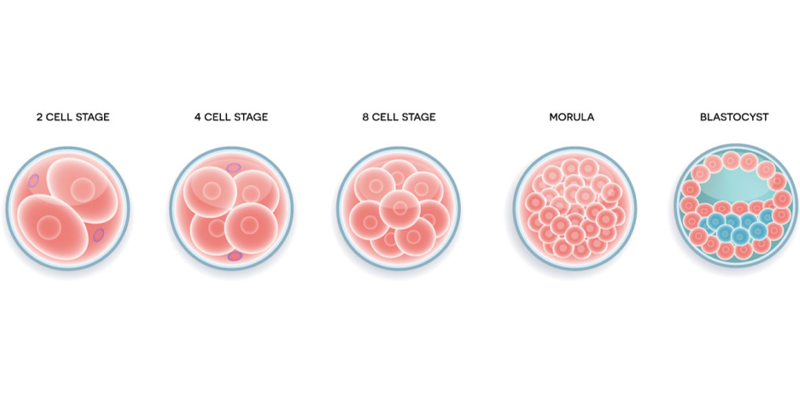With multiple scientific and other approaches present in today’s world, infertility is not the end of the parenthood dream. Among the many options available to conceive a baby, IVF is one of the advanced fertility treatments that can help a couple achieve parenthood. If you are about to take up the IVF process, there are many things that you should know in detail before you proceed. Embryo grading is one such crucial factor that plays a major part in deciding the success rate of IVF treatment, but very few are aware of it.
What is IVF Embryo Transfer?
IVF embryo transfer, also known as the in-vitro fertilization process, is wherein an embryo created in a laboratory is planted into a female’s reproductive system. It’s a modern technique used to help infertile couples have a baby.
However, to truly understand the meaning of IVF embryo transfer, one should know how an IVF procedure is done. Eggs retrieved from a woman and sperm taken from the male partner are allowed to fertilize in the lab. This results in embryo formation. An embryo is a mass of cells that further grows and divides which when put into a woman’s uterus develops into a baby. This simply emphasizes the importance of selecting the best quality embryo. Only the best embryo can ensure a healthy pregnancy and improve the chance of live birth minimizing the risk of miscarriage.
What is Embryo Quality?
Embryo quality is the key factor in predicting a successful IVF outcome. Embryo Quality is defined as the capacity of an embryo to grow into a healthy baby. Genetic and physical factors are considered while evaluating the quality of an embryo. Using the best-quality embryos for IVF embryo transfer increases the likelihood of having a successful pregnancy and a healthy baby.
What is Embryo Grading?
Embryo grading is the term used to refer to the process wherein embryos are analyzed and examined by technicians so that they can be used for in vitro fertilizations.
After the fertilization check, embryologists monitor the development of the embryo. Embryos are evaluated under a microscope based on their appearance, cell shape, number of cells, and several other factors and are graded as good, average, and poor quality. An embryo that has grown up to 3 days is called Day 3 Embryo and one that has grown up to 5 days is called a Blastocyst or Day 5 Embryo.
At 2 stages, embryos are evaluated once at cleavage and another at the blastocyst stage. IVF Embryo transfer is done with a day 3 embryo or a day 5 embryo based on the evaluation.
Grading System:
Embryo grading is actually a tool that is used by professionals in reference to patient data in order to further decide the crucial steps of IVF, which include:
- Optimal day of transfer
- Appropriate number of embryos to transfer
- Specific embryos to transfer
The grading system that is followed for Embryo scoring is based on Alpha Consensus, 2011 and David Gardener’s Embryo Assessment criteria.
Cleavage Stage Embryo grading chart (Day 2 and Day 3)
Criteria used:
- Number of cells – Embryos that cleave to 4 Cells on Day 2 and 8 Cells on Day 3 are considered the best but not all good embryos follow this pattern. Some embryos may have more or less cell numbers depending on the day but can be selected considering other criteria of Embryo grading. The decision of selecting an embryo rests completely on the wisdom of the embryologist.
- Fragmentation – A fragment is defined as an extracellular membrane bound cytoplasmic structure inside an Embryo. The degree of fragmentation is defined as mild (<10%); moderate (10-25%); severe (>25%)
- Multinucleation – Multinucleation is defined as the presence of more than 1 nucleus in a cell/blastomere.
- Cell Size – All cells / blastomeres in a cleavage stage embryo should be stage specific and evenly sized.
Scoring System of Cleavage Embryo
Below mentioned is the scoring system used by embryologists for cleavage embryo selection.
Grade 1: Good:
- <10% fragmentation
- Stage specific cell size
- No multinucleation
Grade 2: Fair:
- 10-25% Fragmentation
- Stage specific cell size for majority of cells
- No multinucleation
Grade 3: Poor:
- Severe fragmentation (>25
- Cell size not specific
- Evidence of multinucleation
Grade 1 and Grade 2 embryos are considered to be the best and are chosen for embryo transfer. Grade 3 Embryos that have very few cells and heavy fragmentation are considered to be of poor quality.
Blastocyst Stage Embryo (Day 5 or Day 6):
Some of the cells of Day 5 embryos form inner cell mass (ICM) which becomes the fetus and some cells form the trophectoderm epithelium (TE) which becomes the placenta.
On what basis, Day 5 Embryo Grading is done?
- Amount of the blastocyst that has expanded ranging from 1 to 4, 4 is the most developed
1 = Early – Blastocoel cavity being less than half the volume of the Embryo
2 = Blastocyst – Blastocoel being greater than half of the volume of Embryo
3 = Expanded – Blastocoel cavity completely fills Embryo
4 = Hatched/ Hatching – Fully Expanded blastocyst with embryo partially / fully coming out of zona
- Quality of ICM grade ranging from A to C wherein A is considered the best
A – Prominent, easily discernible many cells & tightly packed
B – Easily discernible, many loosely packed cells
C – Difficult to discern with few cells
- Quality of TE grade ranging from A to C, wherein A is considered the best
A – Many cells & tightly packed
B – Loosely packed cells
C – Few cells
The first part of the grading is a number followed by 2 letters. Based on this method, in the case of Day 5 grading, for example, if you have a grading like 3AA – this simply means the blastocyst is a good choice for transfer. Embryo transfer is also decided based on the couple’s age, medical history, and some other factors.
What Is the Best Grade of Embryos in IVF?
Grade 1 embryos are considered to be the best grade of embryos in IVF. Due to the tightly packed and well-defined cells, these embryos have a high chance of getting implanted successfully and good fetal development.
Conclusion
Good-quality embryos have a higher likelihood of a successful pregnancy and live childbirth. Although embryo grading is a good and powerful method that helps a fertility specialist select the best possible embryo to optimize the outcomes of IVF, it is important to understand that selecting a good embryo does not seal the fate of the IVF outcome. The success of an IVF procedure depends on the individual’s health and various other factors and the results may vary. Therefore, it is important that one remains optimistic but also has realistic expectations.
To know more about our frozen embryo transfer success rate, check here!

